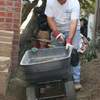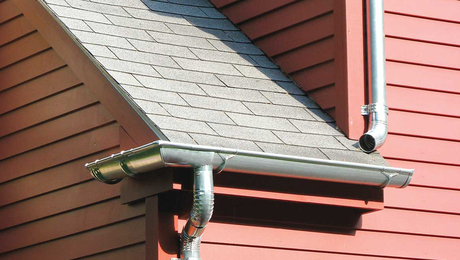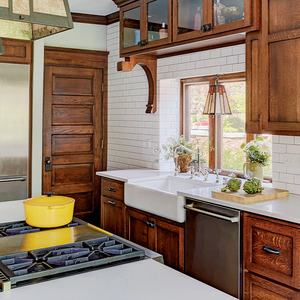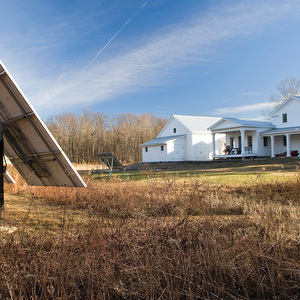capturing reverse osmosis waste water

howdy,
i’m considering installing a reverse osmosis filter for drinking water in my kitchen, and i was curious if instead of connecting the waste water connection to the drain, if i could route it outside the house and into a rainwater storage barrel? seems like the eco-sensitive thing to do would to reuse this water somehow. does this count as grey water, is there anything i would need to be especially careful of?
thanks for any advice!
james



















Replies
We didn't install the RO system in our house and I do not usually recommend it to my customers simply because the quality of water delivered by the local water supply system is pretty good and the waste factor, for which you WILL pay, is somewhere between 2:1 and 4:1. That means for every gallon of water you get to use, 2 to 4 gallons head for the drain.
It's a double wammy here because you pay for the volume of water used which is also the volume used to calculate your sewer rate. Ouch in the pocketbook.
Our filtration system is nothing more than a sediment filter and then the activated charcoal block, and only on the water we use for cooking and drinking - a separate tap.
If on the other hand, you have a use for the waste water, something that you would normally use day-to-day, and the stuff filtered out is not toxic, then have at it with a collection and storage system. If you could use it to flush your john, for instance. You'll have to balance the cost vs return factor in the new plumbing needed whether you get creative or just water the garden.
First of all, does this count as gray water? Only if you run down the drain and then retain it. I wouldn't want to argue this is potable water, but is certainly safe.
Is there anything to be especially careful of? No. RO "concentrate" contains nothing your tap water doesn't already contain, just a little more concentrated.
Why are you looking to RO? I use RO water for all of my drinking and cooking, as well as to water my pets and for my aquarium. But my well water has very high levels of nitrates.
I plumbed our RO system in the laundry room, and ran the drain line long enough to hit either the washing machine or the drain. The waste water trickles into the washer, and while we're doing laundry goes into the drain. It doesn't add very much water but at least is being used instead of wasted.
recycling RO waste water
I see this is an old posting but I'll reply to it anyways. You can re-use your waste water. I have well water rich in calcium, magnesium etc, which is used throughout the house. It is drinkable. But for the kitchen I installed a Reverse Osmosis unit to give us excellent quality water, for drinking, tea and coffee. Here are the numbers from the last time I checked: raw water in had 420 ppm total dissolved solids, fresh water out was 22 ppm, and the waste water was 460 ppm.
That waste water looks good, tastes fine, and in fact cannot be distinguished from the raw well water. I am installing a wastewater recovery pump which will send that water back to the cold inlet of the hot water tank, so our RO unit will be a no-waste device. It doesn't get better than that, especially when you consider the state of many of our aquifers today.
I believe the pump cost me about $85 or so. I bought it (and my entire RO system) online at ecopurewater.com, based in Burnaby, B.C. Canada. I'm sure there must be other suppliers out there, but I really like these guys.
And yes, you can certainly use waste water for irrigation, laundry, whatever. It is entirely sanitary and only a problem if your water contaminents include lead or arsenic. Just my two cents. Paul
That's a great thought. I would say that run the waste water through a filter and connect it to a storage tank. You can use that water in the lawn or garden.
As usual . . .
it depends. In this case, how you use the waste water from an R.O. filter probably depends on what kinds of noxious materials you're filtering out. If the original water is high in heavy metals or arsenic, etc., I probably wouldn't want to use it in any applications where the elements might come back into the food chain. In our case, the kitchen is on the 2nd storey, and the R.O. waste line goes through the floor to the laundry room immediately below it on the 1st floor. We stick the line into the washing machine or the sink as availability requires.
Keep in mind that GloriaSmith is a spammer. That post was just to make her look good.
Ah . . .
did not know that.
Please note I am not spammer. This is very legitimate comment & not such random post.